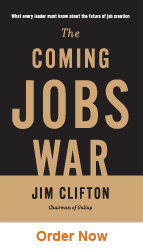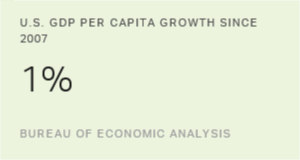If you were to ask me, "From all the data you have studied so far, where will the next economic breakthrough come from?" my answer would be: From the combination of the forces within big cities, great universities, and powerful local leaders. Those three compose the most reliable, controllable solution. Their combined effect is the most predictable solution to America's biggest current problem, which is winning the global war for good jobs.
Economic booms originate in the souls of individuals and great cities.
The cornerstone of these three is cities, especially America's top cities. All cities count and can contribute. But so goes the leadership of the top 100 American cities, so goes the country's economic future.
Of course cities, like organizations and workplaces, exhibit wide variation in economic outcomes. Austin has flourished, while Albany has declined. Sioux Falls is booming, while Sioux City is not. Think how different Detroit's outcomes are from San Francisco's. Detroit went from being one of the most bustling economic cities in the world to one of the most spectacularly failed. One could even argue that citizens in San Francisco saved the republic and national job creation by leading the technology boom. One city is a drain on America, and the other continues to save it.
Globally, the variation between cities is even more defining. Consider the difference between Havana and Singapore. Lee Kuan Yew founded modern-day Singapore and Fidel Castro founded modern-day Cuba at about the same time and under similar circumstances. Singapore is now one of the most progressive modern societies in the world with a super-charged economy and great jobs; Havana is an economic and social disaster. One city worked, one city failed. The difference between these two is primarily the result of one thing: local leadership.
Fixing America's biggest problems and re-winning the world can only be accomplished one city at a time. Ultimately, all solutions are local.
Strong leadership teams are already in place within cities. A natural order is already present, in governments and local business and philanthropic entities. Every city has strong, caring leaders working on numerous committees and initiatives to fuel their local economic growth -- let's call it the city GDP -- and to create good jobs. The feat these leaders have to pull off is doubling their entrepreneurial energy by aligning all their local forces.
They succeed by declaring all-out war.
I don't use the term "war" lightly. This really has to be a war on job loss, on low workplace energy, on healthcare costs, on low graduation rates, on brain drain, and on community disengagement. Those things destroy cities, destroy job growth, and destroy city GDP. Every city requires its own master plan that is as serious as planning for war.
That plan must focus on the following:
1. Recognize that the most important solutions are local. Weak local leaders will look to Washington for more legislation and stimulus packages and more money for R&D to solve their problems. But what they need for job creation -- entrepreneurs, enterprise energy, and the leadership to put it all together -- is right there at home because cities are the highest probability source of job creation.
In 2009, almost half of all venture capital money spent in America went to four cities: New York, Palo Alto, Seattle, and Sunnyvale. So the obvious question is: Why does the Bay Area create so much economic power and not Detroit? Both have the same federal government. They work under the same laws and same rules. But San Francisco and Silicon Valley have created a culture that responds to innovation and creates business models like no other place on Earth. Cities that do this become a beacon for the most talented people in the world.2. Have your whole city wage a war for jobs. Everybody in charge of anything needs to focus on job creation. If they divert their attention, vote them out. Be ruthless. If the bike path doesn't have anything to do with job creation, there is no bike path. If rezoning improves the jobs outlook, rezone.
But not just any job will do -- you want good jobs. The jobs war is won by knowledge jobs. Aim everything at those. The global economy is moving to the knowledge worker. You can build a slaughterhouse in your city, but that can't be the leading job strategy. Good jobs are created by entrepreneurs working with innovators creating a winning business model. The jobs war is what should get city leaders up in the morning, what they should work on all day, and what should keep them from getting to sleep at night.3. Align efforts citywide. Every city needs a team to work on the alignment, focus, and strategies that put all businesses and local institutions of absolutely every kind on the same page. Meanwhile, the whole city has to be participating, highly coordinated, and working out of the same playbook to win.
4. Don't allow your local constituencies to look to Washington. Washington has something for you that is unsustainable or even worse, unhealthy. Free money eventually makes you more dependent. Free money, entitlements, more bureaucracy, less of your control -- all these things make individual initiative, meritocracy, and free enterprise weaker and less competitive.
To reenergize, to strike lightning on your city's GDP growth, its brain gain, its quality job creation, its vitality, and its future prosperity, don't expect national answers. "Everything is local" is truer regarding job creation than anything else. You have to jumpstart your city yourself.
In defense of Washington, it wasn't originally set up to be the nation's economic engine. The U.S. government has seeded whole industries through land grant universities, defense contractors, and scientific and medical researchers to name just a few. But the government has never, will never, nor should it be expected to ignite badly needed sustainable economic booms. These economic booms originate in the souls of individuals and great cities.

